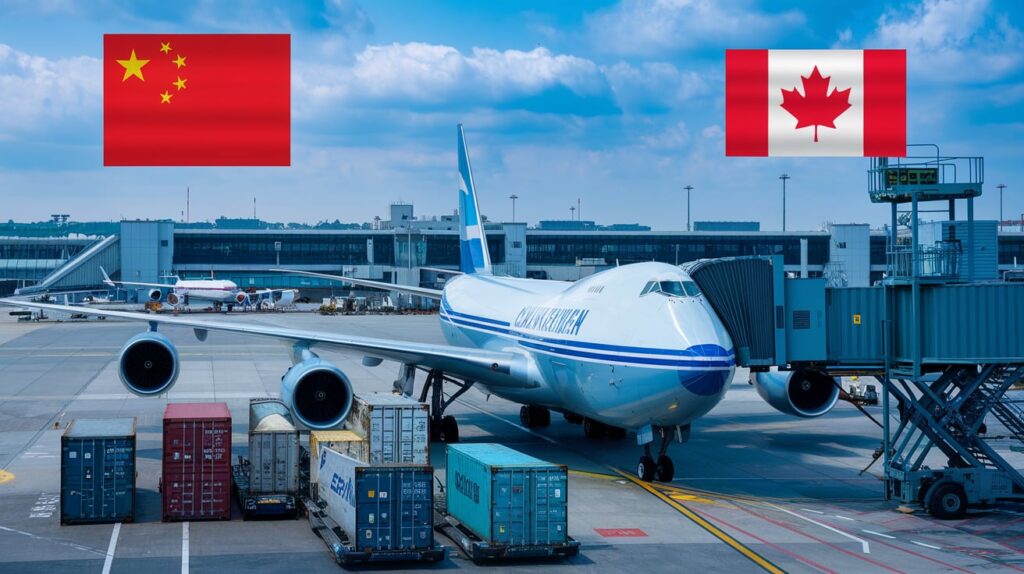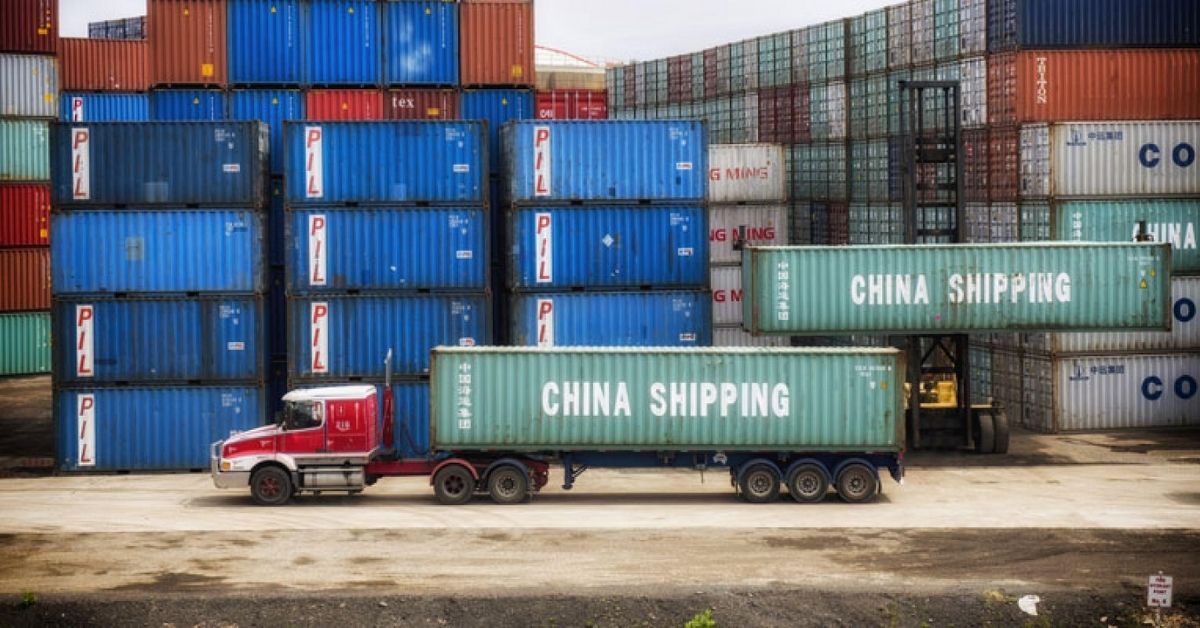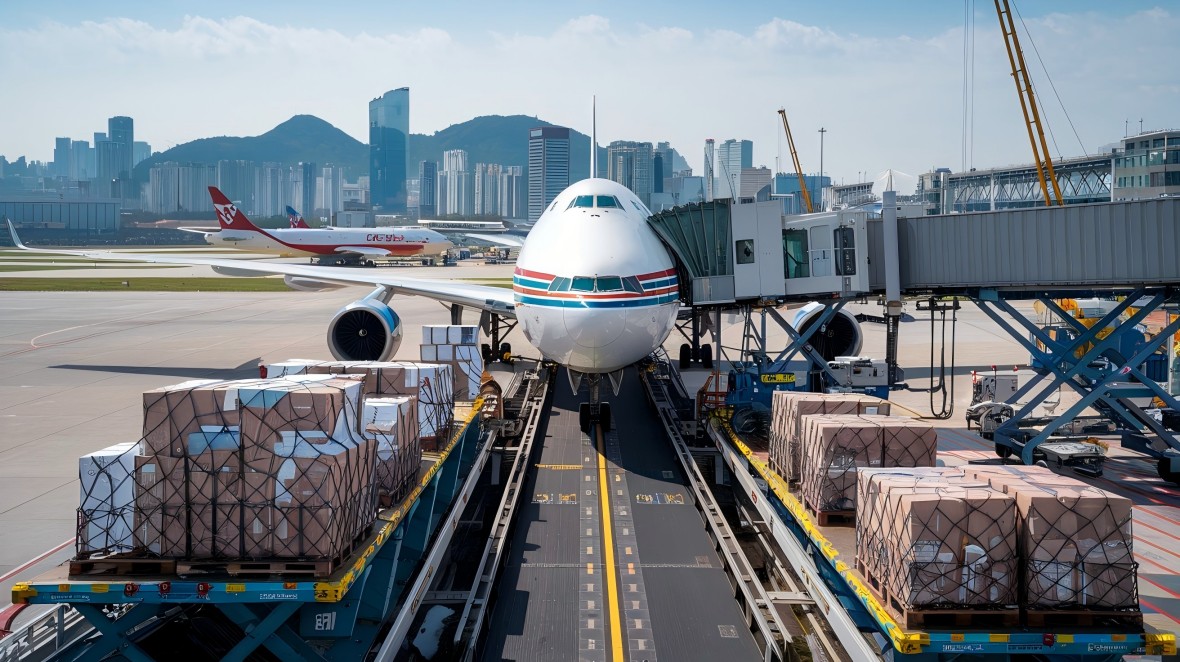Are you considering air shipping from China to Canada but unsure of its benefits and processes? Air freight offers unparalleled speed and efficiency, making it a crucial choice for businesses needing timely deliveries. In this comprehensive guide, we will explore the essential aspects of air shipping, including its key advantages, cost analysis, and tips for overcoming common challenges. By the end of this article, you will be equipped with the knowledge to navigate the complexities of air shipping and make informed logistics decisions.

Understanding Air Shipping from China to Canada
What is Air Shipping?
Air shipping refers to the transportation of goods by aircraft from one location to another, in this case, from China to Canada. This method is particularly popular for businesses looking to import products quickly, as it significantly reduces transit times compared to other shipping methods. Air shipping encompasses a variety of services, including air freight, which involves the bulk transportation of goods, and express courier services that cater to smaller shipments. With air freight from China to Canada, goods are typically transported through major airports and can be delivered to multiple destinations across Canada.
Why Choose Air Freight Over Other Shipping Methods?
Choosing air freight over other shipping methods, like sea freight or rail freight, offers several compelling advantages:
Speed: Air shipping is the fastest mode of transportation available. For example, goods can be transported from Shanghai to Toronto in as little as 5 to 7 days, compared to weeks or even months with sea freight. This makes air freight particularly advantageous for urgent shipments.
Reliability: Air freight is generally more reliable than other methods due to fewer delays. Weather conditions and port congestion, which can significantly impact sea freight, are mitigated in air transport, resulting in more predictable delivery schedules.
Global Reach: With air transport, businesses can access markets across the globe, allowing for the import of goods from various regions of China directly into Canada. This capability is crucial for companies looking to import specialized or high-demand products.
Enhanced Security and Reduced Theft Risk: Goods transported by air are usually monitored and handled with care, leading to a reduced risk of theft and damage. This is particularly important for high-value items or sensitive products.
Flexibility: Air freight services often provide door-to-door delivery options, connecting suppliers and customers seamlessly. This means that goods can be picked up directly from the manufacturer in China and delivered straight to the buyer’s location in Canada without additional handling.
Key Advantages of Air Shipping from China to Canada
Speed and Efficiency of Air Freight
One of the most significant advantages of air shipping is its speed. As noted earlier, air freight can reduce shipping times to as little as 5 to 7 days for a route like Shanghai to Toronto. This rapid transit allows businesses to respond quickly to market demands, fulfill orders faster, and improve customer satisfaction. For industries like e-commerce, where delivery times are crucial, air freight becomes an invaluable asset.
Reduced Risk of Damage During Transit
Air shipping also offers a reduced risk of damage during transit. Unlike sea freight, where goods may be subjected to rough waves and prolonged handling, air freight minimizes the time goods spend in transit. The controlled environment of airplanes, coupled with professional handling, significantly decreases the likelihood of cargo being damaged. This advantage is particularly important for fragile items, electronics, and perishable goods, ensuring they arrive safely and in good condition.
Ideal for Time-Sensitive Goods
For businesses dealing in time-sensitive goods, such as fashion items, electronics, or medical supplies, air shipping is the preferred choice. The fast delivery speeds associated with air freight allow companies to meet tight deadlines, whether it’s for seasonal sales, product launches, or urgent medical supplies. Moreover, air shipping can help businesses maintain a competitive edge in a fast-paced market by ensuring that products are available when customers need them.
In conclusion, air shipping from China to Canada provides numerous advantages, including speed, reliability, and reduced risk of damage. For businesses looking to import goods with efficiency and effectiveness, air freight from China to Canada is undeniably a superior choice, especially when time is of the essence. For those considering air shipping, Dantful International Logistics offers a range of services designed to meet your needs, ensuring a seamless and professional shipping experience. Additionally, if you require expedited shipping from China to Canada, Dantful has tailored solutions to support your logistics requirements.
READ MORE:
- Shipping From China to the USA
- Shipping From China TO Canada
- Shipping From China TO Mexico
- Shipping From China to Panama
- Shipping From China to Costa Rica
- Shipping From China to Brazil
- Shipping From China TO Colombia
- Shipping From China to Jamaica
- Shipping From China to Venezuela
- Shipping From China to Argentina
Cost Analysis of Air Shipping from China to Canada
Factors Influencing Air Freight Costs
Understanding the costs associated with air shipping from China to Canada is crucial for importers. Several factors significantly influence these expenses, making it essential for businesses to grasp how these elements interact.
Weight and Volume Considerations
The costs of air freight are primarily influenced by the weight and volume of the shipment. Air carriers often charge based on the dimensional weight (also known as volumetric weight), which is calculated using the formula:

This means if a shipment is lightweight but bulky, it may incur higher charges than a heavier, more compact shipment. For instance, a shipment weighing 50 kg with dimensions of 100 cm x 50 cm x 50 cm would have a dimensional weight of 500 kg, leading to higher costs.
Seasonal Variations in Pricing
Air freight rates can fluctuate significantly due to seasonal demand. For instance, during peak periods, such as the holiday season or major sales events like Singles’ Day in China, the demand for shipping increases, resulting in higher costs. Conversely, during off-peak seasons, rates often drop, presenting opportunities for cost savings. Expedited shipping from China to Canada can be a beneficial option during these times.
Cost Comparison: Air Freight vs. Sea Freight
When comparing air freight to sea freight, it’s essential to consider more than just the base rate. While air freight is generally more expensive—often ranging from $5.00 to $15.00 per kg, depending on various factors—its speed and efficiency may justify the cost for urgent shipments. In contrast, sea freight costs significantly less, typically between $1.50 to $3.00 per kg, but comes with longer transit times that can extend from a few weeks to over a month.
Here’s a simple comparison of costs and transit times:
| Shipping Method | Average Cost (per kg) | Typical Transit Time |
|---|---|---|
| Air Freight | $5.00 – $15.00 | 3 – 7 days |
| Sea Freight | $1.50 – $3.00 | 20 – 40 days |
Ultimately, businesses must evaluate their priorities, whether speed or cost, when deciding which shipping method to select.
Transit Times for Air Shipping from China to Canada
Typical Transit Times for Different Routes
When planning air shipping from China to Canada, understanding the typical transit times for various routes helps in managing expectations. Below are the average transit times for popular routes:
| Route | Average Transit Time |
|---|---|
| Shanghai to Toronto | 3 – 5 days |
| Shenzhen to Vancouver | 4 – 6 days |
| Beijing to Calgary | 5 – 7 days |
| Guangzhou to Montreal | 5 – 7 days |
These timelines can vary based on factors such as airline schedules, seasonal traffic, and weather conditions.
Customs Clearance and Its Impact on Delivery Times
While air freight is known for its speed, customs clearance can be a critical bottleneck that affects overall delivery times. Importing goods into Canada requires compliance with Canada Border Services Agency (CBSA) regulations. Proper documentation, including a bill of lading, commercial invoice, and relevant permits, is essential for smooth customs clearance. Delays in providing accurate documentation can lead to significant setbacks.
To mitigate risks associated with customs, partnering with a reliable freight forwarder, such as Dantful International Logistics, ensures that all compliance requirements are met, thus expediting the shipping process. With our expertise in customs clearance, we can help streamline your shipments, ensuring timely delivery of your goods from China to Canada.
Essential Documentation for Air Shipping
Required Documents for Importing Goods to Canada
When importing goods to Canada via air shipping, proper documentation is crucial. The following key documents are necessary to ensure smooth customs processing and compliance with Canadian regulations:
Commercial Invoice: This document outlines the transaction details, including the buyer and seller’s information, a description of the goods, total cost, and payment terms. It is vital for customs valuation.
Air Waybill (AWB): The AWB acts as a contract between the shipper and the carrier, detailing the shipment’s route and terms of transportation. It also serves as a receipt for the goods.
Packing List: A packing list provides specific details about the cargo, including dimensions, weight, and the number of packages. This document aids customs officers in verifying the shipment contents.
Customs Declaration: This form is essential for declaring the goods to customs authorities. It includes detailed information about the contents and its value, ensuring compliance with Canadian customs regulations.
Import Permit: For certain regulated goods, such as food products and pharmaceuticals, an import permit may be required. It’s advisable to verify if your product falls under any regulations before shipping.
Certificate of Origin: This document certifies the country of origin of the goods and may be needed for tariff purposes or to demonstrate compliance with trade agreements.
Insurance Certificate: While not always mandatory, providing an insurance certificate can prove beneficial in case of loss or damage during transit.
Ensuring you have all the required documentation in order not only facilitates the import process but also minimizes the risk of delays and additional costs during customs clearance.
Importance of Accurate Documentation in Preventing Delays
Accurate documentation is integral to the success of air shipping from China to Canada. Errors in paperwork can lead to significant delays, fines, and even confiscation of goods. Here are some of the reasons why meticulous attention to detail in your shipping documents is essential:
Customs Compliance: The Canadian Customs Border Services Agency (CBSA) strictly enforces regulations. Any discrepancies in documentation can lead to inspections or audits, delaying the delivery process.
Cost Implication: Delays can result in additional storage fees, higher shipping costs, and potential loss of business due to late deliveries. Ensuring that all documents are accurate and complete can save you money in the long run.
Trust and Reliability: Accurate documentation reflects professionalism and builds trust with your freight forwarder and customs authorities. This can lead to smoother transactions in the future.
Streamlined Processes: Well-prepared documentation helps facilitate faster customs clearance, ensuring that your goods reach their destination as quickly as possible.
In conclusion, investing time and effort in understanding the necessary documentation and ensuring its accuracy is vital for a successful air shipping experience from China to Canada. This diligence helps mitigate risks and contributes to a more efficient supply chain.
Choosing the Right Freight Forwarder for Air Shipping
Role of a Freight Forwarder in International Logistics
A freight forwarder plays a critical role in the logistics chain, serving as an intermediary between importers and carriers. Their expertise in international shipping is invaluable for businesses looking to navigate the complexities of global trade. Here are some key functions performed by freight forwarders:
Coordination of Shipments: They manage the entire shipping process, coordinating between different carriers (airlines, trucking companies) and ensuring timely delivery of goods.
Customs Clearance: Freight forwarders have extensive knowledge of customs regulations and procedures, facilitating smooth customs clearance and reducing delays.
Documentation Management: They assist in preparing and verifying all necessary shipping documents, which reduces the burden on importers and ensures compliance with regulations.
Negotiation of Rates: With established relationships with carriers, freight forwarders can negotiate favorable shipping rates, ultimately saving costs for their clients.
Risk Management and Insurance: They provide insights on insurance options and help clients mitigate risks associated with shipping, such as damage or loss of goods.
How to Select a Reliable Freight Forwarder
Choosing the right freight forwarder is crucial for a successful air shipping experience from China to Canada. Here are some factors to consider when selecting a reliable freight forwarder:
Experience and Expertise: Look for a forwarder with extensive experience in handling shipments from China to Canada, especially for the type of goods you are importing.
Reputation and Reviews: Research the forwarder’s reputation by reading customer reviews and testimonials. Recommendations from other businesses can provide valuable insights.
Services Offered: Ensure that the forwarder provides comprehensive services that match your needs, including air freight, customs clearance, warehousing, and insurance.
Network and Partnerships: A well-established freight forwarder should have a strong network of carriers and partners, ensuring flexibility and reliability in shipping options.
Transparency in Pricing: Choose a forwarder that offers clear and transparent pricing structures, without hidden fees. Request a detailed quote that breaks down costs for better clarity.
Customer Support: Reliable customer support is vital. Ensure that the forwarder offers accessible communication channels and is responsive to inquiries or issues.
By carefully considering these factors, you can select a freight forwarder who will facilitate a seamless and efficient air shipping process from China to Canada, allowing you to focus on growing your business without the headaches of logistics management.
At Dantful International Logistics, we pride ourselves on being a highly professional, cost-effective, and high-quality one-stop logistics service provider for global traders. Our team specializes in air freight, and we are here to assist you with every step of your international shipping journey.
Common Challenges in Air Shipping from China to Canada
Customs Regulations and Compliance Issues
When engaging in air shipping from China to Canada, understanding the intricate web of customs regulations is paramount. Canada has stringent import policies that require importers to comply with various regulations, including the Customs Act and the Customs Tariff. Failure to comply can result in delays, additional fees, or even the confiscation of goods.
One major aspect importers must be mindful of is the classification of goods under the Harmonized System (HS) codes. Accurate classification affects duty rates and the eligibility of certain goods for preferential tariffs. Furthermore, importers must ensure compliance with the Canadian Food Inspection Agency (CFIA) if shipping food products or the Health Canada standards for consumer goods. Non-compliance can lead to significant delays at customs.
Additionally, it is essential to be prepared for possible inspections by the Canada Border Services Agency (CBSA). These inspections can slow down the shipping process, emphasizing the importance of thorough documentation. Ensuring that all required documents, such as the Commercial Invoice, Bill of Lading, and Packing List, are correctly filled out and attached can mitigate these risks.
Handling Delays and Unexpected Costs
Delays in air shipping can occur due to various factors, including adverse weather conditions, logistical issues, or customs holdups. For businesses reliant on timely delivery, these delays can have ripple effects throughout the supply chain. To minimize disruption, it is advisable to build in buffer time when scheduling shipments.
Unexpected costs can also arise during the shipping process. These can include storage fees incurred if goods are delayed in customs or additional charges for re-routing shipments. Having a clear understanding of the potential costs involved in air shipping is crucial. A reliable freight forwarder like Dantful International Logistics can provide transparency regarding these costs and offer insight into managing them effectively.
Tips for Successful Air Shipping from China to Canada
Best Practices for Packaging and Labeling Goods
Effective packaging and labeling are vital components of successful air shipping. Proper packaging safeguards goods against potential damage during transit, especially in the fast-paced environment of air freight. Use durable materials and ensure items are secured tightly within their packaging.
Labeling should be clear and comprehensive. Each package should have the following:
- Recipient’s Name and Address: Accurate details help in the swift delivery of goods.
- Contents Description: This aids in customs processing and helps avoid delays.
- HS Codes: Including HS codes on the labels can expedite customs clearance.
Additionally, utilizing a right-sized package can help minimize dimensional weight charges, saving costs on shipping.
Strategies to Minimize Costs and Maximize Efficiency
To ensure a cost-effective and efficient air shipping process, consider the following strategies:
Consolidate Shipments: If feasible, consolidate multiple smaller shipments into one larger shipment. This can significantly reduce per-unit shipping costs.
Negotiate Rates with Freight Forwarders: Establish relationships with reputable freight forwarders such as Dantful International Logistics that can offer competitive rates and valuable insights on cost-saving opportunities.
Utilize Technology: Employing logistics management software can streamline the shipping process by providing real-time tracking and updates, thereby improving communication and reducing the risk of delays.
Plan Ahead: Schedule shipments in advance to avoid peak seasons when air freight costs may surge. This foresight can lead to better pricing and availability.
By incorporating these best practices and strategies, importers can navigate the challenges of air shipping from China to Canada while optimizing their processes and ensuring timely delivery of their goods.

Young Chiu is a seasoned logistics expert with over 15 years of experience in international freight forwarding and supply chain management. As CEO of Dantful International Logistics, Young is dedicated to providing valuable insights and practical advice to businesses navigating the complexities of global shipping.





















 Afrikaans
Afrikaans Shqip
Shqip አማርኛ
አማርኛ العربية
العربية Հայերեն
Հայերեն Azərbaycan dili
Azərbaycan dili Euskara
Euskara Беларуская мова
Беларуская мова বাংলা
বাংলা Bosanski
Bosanski Български
Български Català
Català Cebuano
Cebuano Chichewa
Chichewa 简体中文
简体中文 繁體中文
繁體中文 Corsu
Corsu Hrvatski
Hrvatski Čeština
Čeština Dansk
Dansk Nederlands
Nederlands English
English Esperanto
Esperanto Eesti
Eesti Filipino
Filipino Suomi
Suomi Français
Français Galego
Galego ქართული
ქართული Deutsch
Deutsch Ελληνικά
Ελληνικά Kreyol ayisyen
Kreyol ayisyen Harshen Hausa
Harshen Hausa Ōlelo Hawaiʻi
Ōlelo Hawaiʻi עִבְרִית
עִבְרִית हिन्दी
हिन्दी Hmong
Hmong Magyar
Magyar Íslenska
Íslenska Igbo
Igbo Bahasa Indonesia
Bahasa Indonesia Gaeilge
Gaeilge Italiano
Italiano 日本語
日本語 Basa Jawa
Basa Jawa ಕನ್ನಡ
ಕನ್ನಡ Қазақ тілі
Қазақ тілі ភាសាខ្មែរ
ភាសាខ្មែរ 한국어
한국어 كوردی
كوردی Кыргызча
Кыргызча ພາສາລາວ
ພາສາລາວ Latin
Latin Latviešu valoda
Latviešu valoda Lietuvių kalba
Lietuvių kalba Lëtzebuergesch
Lëtzebuergesch Македонски јазик
Македонски јазик Malagasy
Malagasy Bahasa Melayu
Bahasa Melayu മലയാളം
മലയാളം Maltese
Maltese Te Reo Māori
Te Reo Māori मराठी
मराठी Монгол
Монгол ဗမာစာ
ဗမာစာ नेपाली
नेपाली Norsk bokmål
Norsk bokmål پښتو
پښتو فارسی
فارسی Polski
Polski Português
Português ਪੰਜਾਬੀ
ਪੰਜਾਬੀ Română
Română Русский
Русский Samoan
Samoan Gàidhlig
Gàidhlig Српски језик
Српски језик Sesotho
Sesotho Shona
Shona سنڌي
سنڌي සිංහල
සිංහල Slovenčina
Slovenčina Slovenščina
Slovenščina Afsoomaali
Afsoomaali Español
Español Basa Sunda
Basa Sunda Kiswahili
Kiswahili Svenska
Svenska Тоҷикӣ
Тоҷикӣ தமிழ்
தமிழ் తెలుగు
తెలుగు ไทย
ไทย Türkçe
Türkçe Українська
Українська اردو
اردو O‘zbekcha
O‘zbekcha Tiếng Việt
Tiếng Việt Cymraeg
Cymraeg יידיש
יידיש Yorùbá
Yorùbá Zulu
Zulu